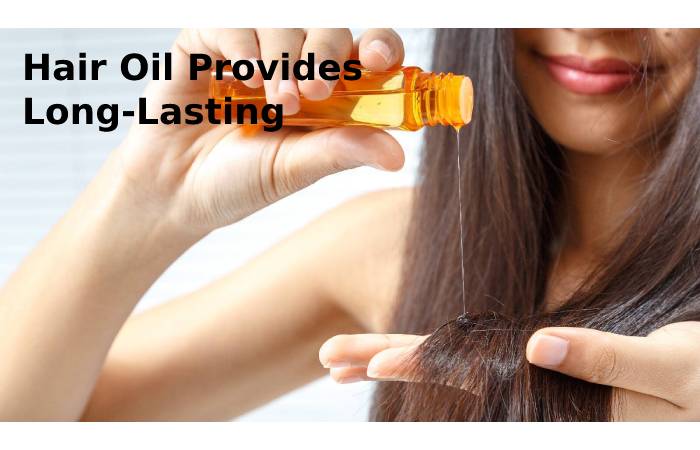Table of Contents
The Oil Protects
Hair Oil Disciplines The Lengths
Benefits Of Using Hair Oil – Daily oils make it possible to soften and discipline the lengths. As a bonus, they provide a shiny and radiant finish. As they are necessarily a little heavy, it is better to avoid them if you have delicate or limp hair. Or apply a few dew drops to the tips as if it were a serum. You can also choose relatively light oils, those of camellia or argan. Or opt for treatments based on mixed oils, which frequently contain silicones. In the organic version, blends are also based on esterified fats, whose molecular chain has been broken to lighten the texture. We do not hesitate to use richer ointments if the hair is thick. For example, corn germ oil, incredibly soft to the touch, or coconut oil, is ideal for smoothing frizz.
Hair Oil Provides Long-Lasting

Protection: There’s nothing like oil to protect the hair from external aggressions: it notably acts as a barrier against humidity, provided you coat the hair generously with it. “Water is indeed the worst enemy of the hair, affirms Patrick Canivet, technical director of the professional division of L’Oréal. Like a sponge, it absorbs moisture. Its scales open, free radicals penetrate, damage the fiber and alter the color”. This protection is mechanical, and any oil will do, even the olive oil used in cooking.
But the specific elixirs use oils enriched with antioxidant vitamin C, such as moringa, or even have UV filters .. Lighter on the hair, they also often contain silicones, which sheath the lengths. It can be an alternative if you can’t stand the stickiness of natural oil and want a more discreet result.
Hair Oil Regenerates The Fiber
Hairdressers are unanimous, nothing like an oil bath to repair a damaged fiber. For Patrick Canivet, “oil alone cannot regenerate the scales. Its action consists of sticking them back together or preventing them from coming off by protecting them from friction”. So there is no point in leaving it on for hours, 30 minutes before shampooing. That’s enough, provided you mix the lengths to impregnate them deeply. “By applying the oil to wet hair, you get even better results because the water improves its penetration,” explains Amanda Gerentes, director of scientific communication for Melvita.
If the hair is damaged, you can apply the oil before a hair mask to reinforce its moisturizing side or even mix the two if the hair is very thick. The most interesting are fruit kernel oils (apricot kernel, sweet almond, grapeseed oils, etc.), which are very rich in fatty acids. Then, we go to the shampoo to eliminate the excess and finish by rinsing with vinegar or the juice of a lemon thinned in lukewarm water. Perfect for removing residue and making hair shine.
Hair Oil Cleanses Without Attacking
Based on the principle that oil removes oil, the Shu Uemura brand has developed an oil shampoo dedicated to hair that tends to excess sebum. “The oil emulsifies the sebum and, when rinsed, everything goes away,” specifies Jean-Marie Greyl, botanical specialist for the Leonor Greyl brand, whose Wheat germ oil has treated greasy hair for years.
The advantage of shampoos in oil form is that they contain fewer surfactants (washing agents). However, these can be irritating and accelerate the production of sebum. A bit of advice? Rinse the hair for a long time with hot water (but not too much) to remove all traces of shampoo.
Purpose Of Hair Oil Applying For Hair Growth
The Man purpose of hair oil is to with a history that dates back hundreds of years, the usage of lubricants is nothing new, but our knowledge of oils continues to grow. We have become much wiser about how oils can affect different aspects of life. Due to the moisturizing and protective effect oils can have on hair and skin are ideal for softening and healthy hair and scalp.
Good hair oil can be charity in different ways, depending on your hair type and needs. It may be a good idea to try other hair oils or focus specifically on oil that suits your wants and hair type, as there are many different types. For example, some oils are best for fine hair, while others are healthier for curls or dry hair (we’ll get to that).
The Right Choice Among All The Hair Oils
We Have Divided Them Into Two Categories
Vegetal Oils
Vegetable oils, called fatty oils, base oils, or carrier oils, are typically derived from nuts, seeds, berries, flowers, or leaves. Carrier oils are greasy and oilier than essential oils and don’t evaporate like essential oils. The function of oils in seeds is to protect the foundation while it is still part of the plant.
Essential Oils
Essential oils are extracted from altered plant parts, including flowers, trees, grasses, leaves, and roots. They can be removed from leaves, berries, resin, cones, needles, rhizomes, fruits and shells, and other parts of a plant. Note that not all plants produce vital oils.
Conclusion
The natural process does not always work as nature intended! With modern fashioning and coloring techniques, our natural sebum production is often insufficient to keep our hair hydrated. That’s where hair oil comes in. Good hair oil replenishes your natural sebum and provides the protection and moisture your hair needs.
